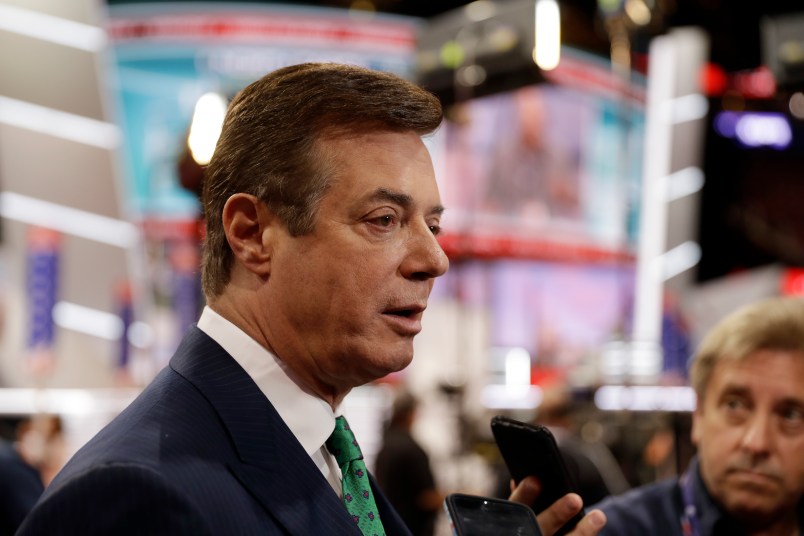A federal judge Friday revoked the bail of former Trump campaign chairman Paul Manafort and ordered him taken into custody after he was accused of tampering with witnesses in special counsel Robert Mueller’s criminal case against him.
“I have struggled with this decision,” U.S. District Judge Amy Berman Jackson said before announcing her decision.
Manafort had been accused by special counsel Robert Mueller of reaching out to two former business partners who allegedly helped coordinate his lobbying effort for Ukraine in the United States. After initially asking the judge to revoke his bond, the special counsel brought new charges approved by a grand jury of obstruction of justice against Manafort and his longtime business Konstantin Kilimnik for the alleged communications.
Manafort pleaded not guilty to those charges Friday.
At Friday’s hearing Manafort’s attorney Richard Westling argued that a revocation of Manafort’s bail was not necessary, and that the judge could hand down an order more clearly stipulating that Manafort was not to speak to witnesses in the case. He argued that the case was one that the “government continued to expand” and that put Manafort in a position of not knowing if people he was contacting were potential witnesses.
“A clear no-contact rule” will solve the problem, Westling argued.
Mueller’s team, represented by Greg Andres, meanwhile argued that Manafort had shown a “history of deception,” and that a no-contact list was not sufficient to protect the community from the danger of Manafort committing other crimes.
Jackson took a 30 minute recess after the hour-long hearing where she heard both sides’ arguments.
When she returned to announce her decision, she said she had thought about it “long and hard,” and that she had “no appetite” to send him to jail. But, she concluded there were no additional conditions she could impose on him, short of detaining him, that would suffice.
“This is not middle school. I cannot take his cell phone,” she said. He was led into custody immediately after she announced her decision. His wife was present at the hearing, and appeared shell-shocked as she departed the court room.
Manafort’s trial in D.C. is scheduled for mid-September. He is also facing charges in Virginia, where the trial is slated to begin in late July. The judge in the Virginia case had imposed an order banning Manafort from contacting witnesses — an order Jackson said she had taken into consideration in her decision Friday, even though it was not in her jurisdiction to enforce it.
The charges Manafort is facing include failure to disclose foreign lobbying, money laundering, bank fraud and tax fraud. He has pleaded not guilty in both cases.
According to the prosecutors, Manafort first attempted to reach out to his former business associate — called “D1,” but revealed to be Alan Friedman when an unredacted version of the filing accidentally became public due to a clerical error — the day after Mueller revealed new charges that included allegations that Manafort organized a group of ex-European politicians known as the Hapsburg group to lobby for Ukraine.
He called Friedman on February 24 and had a minute-plus conversation. Andres revealed new details about the conversation on Friday, provided to the prosecutors by Friedman’s lawyers. Friedman was driving in rural Italy when he received Manafort’s call, but his phone did not show Manafort’s number.
Manafort allegedly told Friedman who he was and said he needed to talk to him about the Habsperg group, before Friedman hung up, according to Andres.
Manafort would go on to send a number of encrypted texts to Friedman, while Kilimnik would try to reach out via text to Friedman and to Eckart Sager (known as “D2” in the filings), according to the prosecutors.
Andres also revealed Friday that the prosecutors only became aware of the alleged witness tampering when the two witnesses came to them. He said prosecutors did not find out about them due to any monitoring or search warrants sought on Manafort. The prosecutors asked Jackson in late May to hold off on considering a bail package Manafort had offered to get out from house arrest, while they further investigated the allegations, leading to the public documents filed on June 4 formally asking the judge to revoke his bail.
Additionally, Andres alleged more broadly that Manafort engaged in deceptive tactics that made keeping him out on bail untenable. He said that Manafort, rather than send emails to communicate with associates, managed shared email accounts where he would write draft emails and leave them in the draft folder for his associates to view by signing into the shared account.










